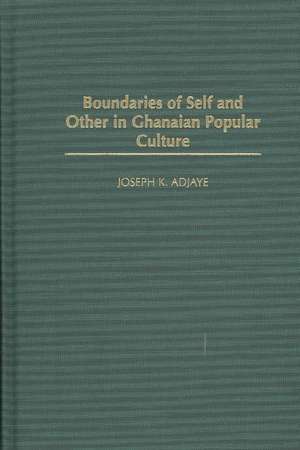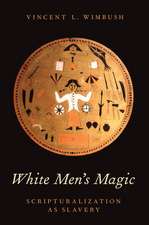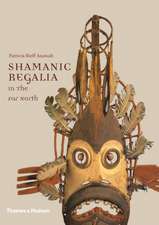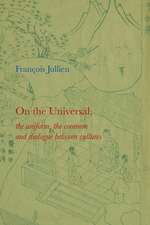Boundaries of Self and Other in Ghanaian Popular Culture
Autor Joseph K. Adjayeen Limba Engleză Hardback – 30 mar 2004 – vârsta până la 17 ani
Preț: 466.73 lei
Preț vechi: 645.84 lei
-28% Nou
Puncte Express: 700
Preț estimativ în valută:
89.31€ • 93.06$ • 73.95£
89.31€ • 93.06$ • 73.95£
Carte tipărită la comandă
Livrare economică 03-17 aprilie
Preluare comenzi: 021 569.72.76
Specificații
ISBN-13: 9780325001036
ISBN-10: 0325001030
Pagini: 208
Dimensiuni: 156 x 235 x 20 mm
Greutate: 0.45 kg
Ediția:New.
Editura: Bloomsbury Publishing
Colecția Greenwood
Locul publicării:New York, United States
ISBN-10: 0325001030
Pagini: 208
Dimensiuni: 156 x 235 x 20 mm
Greutate: 0.45 kg
Ediția:New.
Editura: Bloomsbury Publishing
Colecția Greenwood
Locul publicării:New York, United States
Notă biografică
Joseph K. Adjaye is Associate Professor of History in the Black Studies and History Departments of the University of Pittsburgh.
Cuprins
CONTENTSCONTENTSContents Acknowledgments vii1 Introduction 12 The Performativity of Akan Libations: An Ethnopoetic Construction of Reality 133 Naming, Identity, and Personhood in Akan Cultural Practice 414 Dangerous Crossroads: Liminality and Contested Meaning in Krobo Dipo Girls' Initiation 595 Edina Asafo, Bakatue Festival, and the Democratization of Ritual 836 Citizenship, Community, and the Struggle for Public Space: Takyiman Apo? Mmrante? (Youngmen) and the Negation of Dominant Narratives of Structure 1097 Funerals and the Construction of Self and Other in Akan Society 1398 Conclusion 163Bibliography 177Index 191About the Author 197
Recenzii
Adjaye builds a clear, intelligent, and sophisticated framework, always employing several layers of theoretical constructs and thereby demonstrating the intellectual evolution of thinking about his subject. His prose sometimes bristles with terminology, but it does not descend into jargon.
With Boundaries of Self and Other in Ghanaian Popular Culture (2004), Joseph Adjaye offers us an inspiring ethnography of several rituals among the Akan, Krobo, and Bono in Ghana. The book offers a vivid impression of the (post)colonial transformations of libations, funerals, naming ceremonies, female initiation practices and two festivals (Bakatue and Apoo), which the author tries to explain by using and refining different theoretical approaches. The strength of this book is situated in the author's personal experiences..[A]djaye has given the reader an inspiring book, which combines multiple theoretical lines within anthropology and other disciplines in the field of ritual studies. It raises many questions of interest to performance-oriented scholars and indicates possible routes for future research.
[N]o previous study has placed before the reader such a rich, multidisciplinary collection of original essays on African ritual practices that are grounded in solid empirical investigation and cutting-edge theoretical formulation. Indeed, Adjaye's application of antiuniversalist interpretations to ritual processes brings fresh contexts, thereby considerably enriching our understanding of ritual actions in the social construction of African experience and realities. Further, Adjaye's book is a significant addition to the emergent literature on indigenous ways of knowing in the African field. It is not only a much-needed text for students of history, anthropology and sociology, but also a book that should appeal to the general readership on Africa.
Joseph K. Adjaye, well-known historian of Asante diplomacy, has set a new standard for studies of African ritual and performance in this important monograph..Scholars should take advantage of the conceptual heavy lifting Adjaye has done in this work to further understand the interplay of self and other in the development of Africa's cultural heritage.
[A]djaye has given us a remarkable piece of work that is theoretically sophisticated and empirically rigorous; a readable text that is suitable not only for students of history, anthropology and sociology, but students in several humanities disciplines as well. It is so rich and original that it should also excite a broader, general audience.
With Boundaries of Self and Other in Ghanaian Popular Culture (2004), Joseph Adjaye offers us an inspiring ethnography of several rituals among the Akan, Krobo, and Bono in Ghana. The book offers a vivid impression of the (post)colonial transformations of libations, funerals, naming ceremonies, female initiation practices and two festivals (Bakatue and Apoo), which the author tries to explain by using and refining different theoretical approaches. The strength of this book is situated in the author's personal experiences..[A]djaye has given the reader an inspiring book, which combines multiple theoretical lines within anthropology and other disciplines in the field of ritual studies. It raises many questions of interest to performance-oriented scholars and indicates possible routes for future research.
[N]o previous study has placed before the reader such a rich, multidisciplinary collection of original essays on African ritual practices that are grounded in solid empirical investigation and cutting-edge theoretical formulation. Indeed, Adjaye's application of antiuniversalist interpretations to ritual processes brings fresh contexts, thereby considerably enriching our understanding of ritual actions in the social construction of African experience and realities. Further, Adjaye's book is a significant addition to the emergent literature on indigenous ways of knowing in the African field. It is not only a much-needed text for students of history, anthropology and sociology, but also a book that should appeal to the general readership on Africa.
Joseph K. Adjaye, well-known historian of Asante diplomacy, has set a new standard for studies of African ritual and performance in this important monograph..Scholars should take advantage of the conceptual heavy lifting Adjaye has done in this work to further understand the interplay of self and other in the development of Africa's cultural heritage.
[A]djaye has given us a remarkable piece of work that is theoretically sophisticated and empirically rigorous; a readable text that is suitable not only for students of history, anthropology and sociology, but students in several humanities disciplines as well. It is so rich and original that it should also excite a broader, general audience.












